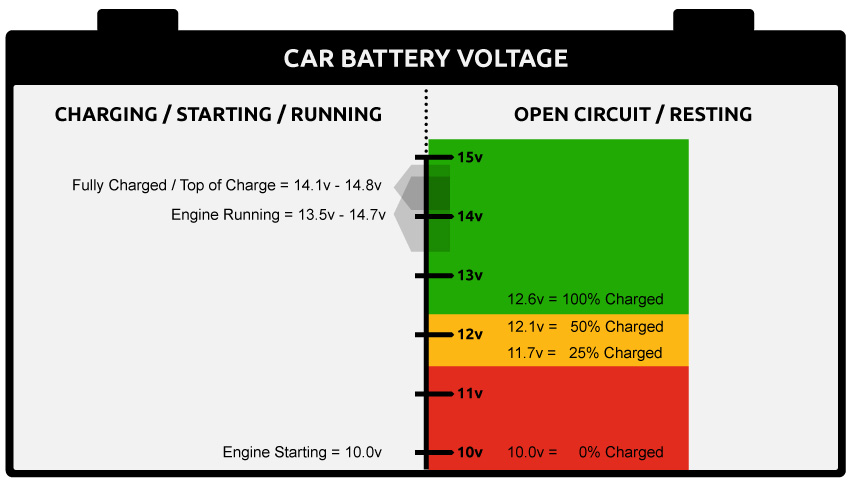Car battery voltage ranges between 12.6 to 12.8 volts when fully charged. This voltage indicates optimal battery health.
A car battery’s voltage range is a critical factor in determining its performance and longevity. Understanding the ideal voltage range for a car battery can help prevent issues such as starting problems or battery failure. Typically, a fully charged car battery should measure between 12.
6 to 12. 8 volts. Monitoring and maintaining the voltage within this range is essential to ensure that your vehicle starts reliably and functions smoothly. In this blog post, we will delve deeper into the significance of car battery voltage range and provide insights on how to keep your battery in top condition for optimal vehicle performance.

Credit: www.lokithorshop.com
Contents
Car Battery Basics: Starting Strong
Anatomy Of A Car Battery
A car battery is a crucial component of a vehicle’s electrical system. It is typically a lead-acid battery, consisting of six cells, each producing 2.1 volts, to provide a total of 12.6 volts when fully charged.
Voltage Essentials
The voltage of a car battery is a critical factor in its performance. A fully charged battery should measure around 12.6 to 12.8 volts. When the engine is running, the alternator generates electricity, and the voltage should read between 13.7 and 14.7 volts. If the voltage falls below 12.4 volts, it may indicate a weak battery that requires attention.

Credit: www.genixenergy.com
Optimal Voltage Ranges: Powering The Journey
A car battery’s voltage range is crucial for ensuring your vehicle runs smoothly and efficiently. Understanding the optimal voltage ranges can help prevent unexpected breakdowns and keep your journey on track.
Standard Voltage Range
The standard voltage range for car batteries is 12.6 to 12.8 volts when the vehicle is not running. When the engine is running, the voltage should be 13.7 to 14.7 volts, indicating that the alternator is charging the battery.
Signs Of Voltage Fluctuations
- Dimming headlights
- Slow engine cranking
- Electrical system malfunctions
Voltage fluctuations can lead to various issues, affecting the performance of your vehicle. Monitoring voltage levels and recognizing signs of fluctuations are essential for maintaining a healthy car battery.
Maintenance And Troubleshooting: Keeping The Charge
Maintaining the optimal voltage range of a car battery is crucial for its longevity and performance. Regular troubleshooting can help detect issues early on and prevent battery failure. Keeping the charge within the recommended voltage range can also improve fuel efficiency and reduce emissions.
Car batteries are the unsung heroes of the automotive world. Without them, our cars would be lifeless machines. However, batteries are not immortal, and they require proper maintenance to keep them running efficiently. This is where routine checks for battery health and solving common voltage issues come into play.
Routine Checks For Battery Health
A battery that is not well-maintained will eventually lose its charge and fail to start your car. Routine checks can help you identify potential problems before they become major issues. Here are some of the essential checks you should perform on your car battery:
- Check the battery terminals and cables for any signs of corrosion, wear, or damage.
- Inspect the battery case for cracks, leaks, or bulges.
- Test the battery’s voltage using a multimeter or voltmeter.
- Ensure that the battery is securely held in place by the battery tray.
- Check the electrolyte levels in the battery if applicable.
Solving Common Voltage Issues
Low voltage can be caused by several factors, including a weak alternator, a bad battery, or a faulty charging system. Here are some of the most common voltage issues and how to solve them:
| Issue | Cause | Solution |
|---|---|---|
| The battery won’t hold a charge | Bad battery or charging system | Replace the battery or repair the charging system |
| The car won’t start | Dead battery or bad starter | Jump-start the battery or replace the starter |
| The battery keeps dying | Parasitic drain or faulty alternator | Identify and fix the parasitic drain or replace the alternator |
In conclusion, maintaining your car battery is crucial for ensuring that your vehicle starts and runs smoothly. Routine checks and timely troubleshooting can help you prevent battery problems and save you from costly repairs.

Credit: www.batteriesplus.com
Frequently Asked Questions
Here are some FAQs about the car battery voltage range –
What Is The Ideal Voltage Range For A Car Battery?
The ideal voltage range for a car battery is 12. 6 to 12. 8 volts when fully charged.
How Does Low Voltage Affect Car Battery Performance?
Low voltage can lead to starting difficulties and may damage the battery’s cells and lifespan.
What Are The Consequences Of Overcharging A Car Battery?
Overcharging a car battery can cause excessive water loss and lead to overheating, shortening its lifespan.
Can Extreme Temperatures Affect Car Battery Voltage?
Yes, extreme temperatures can lower a battery’s voltage, affecting its performance and lifespan.
How Often Should Car Battery Voltage Be Checked?
It is recommended to check the car battery voltage every three months to ensure optimal performance.
Conclusion
To ensure your car’s battery is performing optimally, understanding the voltage range is crucial. With a voltage range of 12. 6 to 12. 8 volts when fully charged, and 11. 8 to 12. 2 volts when partially charged, you can gauge its health and determine if it needs recharging or replacement.
Regularly monitoring your battery’s voltage is a simple yet effective way to avoid unexpected breakdowns and ensure a smooth driving experience. Stay proactive and keep your car running smoothly by paying attention to your battery’s voltage range.